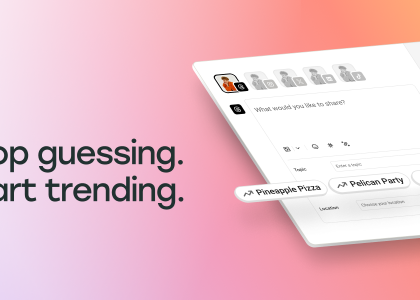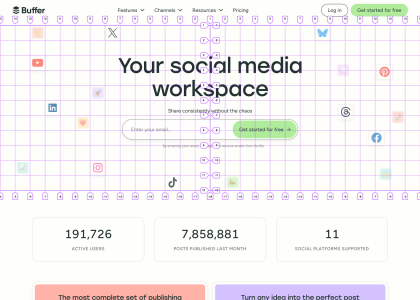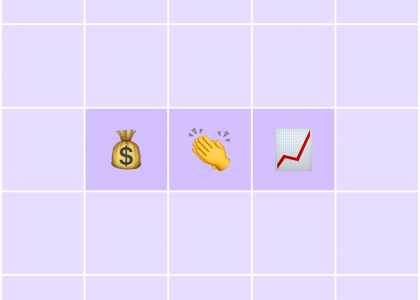Trying to get more views on YouTube can often feel like screaming into the void. (*“Hello? Is anyone there?”*)
It can be disheartening to stay stuck with the same 100–200 views. In this article, I’ll share 13 actionable strategies for increasing your YouTube videos’ views.
Your videos can get discovered in one of four ways:
Someone found your video on their YouTube homepageSomeone saw your video in the “Suggested” tab while looking at another videoSomeone saw you or someone else promoting your video on other marketing channelsSomeone searched for a keyword in Google or on YouTube, and your video popped up
I’ll share 13 ways to get more YouTube views in each of the above four categories. But before we do that, we have to ensure you’ve got the basics right.
Have you got these three basics right?
Working toward getting more views on YouTube is only fruitful when you’ve set your foundation for success. Here are the three things I assume you’ve already ticked off:
You have a solid niche for your YouTube channel. You can’t upload a video about productivity today and about a skincare haul tomorrow. Your YouTube presence has got to have a narrow focus and theme.You are publishing videos consistently. Consistency is the name of the game on every social media platform and YouTube is no exception. You can’t publish three videos in a year and expect your views to skyrocket.Your production quality is excellent. YouTube content thrives on well-edited content. You can’t be Picasso from day one, but you must ace the basics of the technicalities of a good video. Your audio should be crystal clear, video editing should be top-notch, and visuals should be engaging.
What if you haven’t crossed any of the above items in your YouTube strategy? No worries! It takes time for any creator to find their footing and get in the groove of consistently creating videos. Bookmark the tips below for future reference when you’ve solidified these bedrocks.
How to get more views on YouTube via search
YouTube search is a search engine just like Google. People come onto this social media site to search for specific queries. The best part? YouTube even shows up in Google’s search results plenty of times.
The YouTube videos that rank on Google might be different from those that rank on YouTube. But optimizing your videos for search is the same workflow. Here are three tips to get more views on YouTube via YouTube search:
1. Understand how YouTube SEO works
YouTube SEO can be summarized in two steps:
Figure out what keywords your audience uses to search queriesOptimize your videos to include those keywords to show up in search results
How do you figure out which keywords your target audience uses?
Relevant keywords are the heart and soul of video SEO. Your keywords are the words and phrases your potential subscribers use on search engines to find answers to their problems.
For example, if someone wants a video on how to assemble an IKEA table, they will search for, “How to assemble my IKEA table.” That’s your target keyword.
You can find relevant keywords by either:
a. Thinking like your target audience and using the keywords and phrases they would use in a search engine
b. Using free SEO tools to determine your target keywords
First, let’s discuss how to think like your target audience to find relevant keywords.
Let’s say you publish videos around skincare. Now, think, “What would my audience want to watch about skincare? What are their problem areas that I could help with?”
If you determine that your audience is struggling with acne, search for “how to deal with acne,” and YouTube will recommend more long-tail keywords in the autocomplete search bar. It shows you your YouTube channel’s target keywords.
You can also use this autocomplete tactic with other search engines, like Google or Pinterest.
You can also use free SEO tools like Answer the Public to determine what kind of questions your audience is asking about any topic. When I selected ‘YouTube’ on Answer the Public and ran the same acne query, it showed me a list of questions this topic’s target audience is grappling with.
For example, if you publish videos on productivity, don’t start by targeting “how to be more productive” as a keyword. It’s way too crowded and competitive. Try something more specific and niche, like, “how to be more productive on weekends.”
How do you optimize your YouTube videos so they show up in search results?
You did your due diligence in keyword search and found a bunch of primary and secondary keywords your audience is searching for. How do you now optimize your videos for search? Include your keywords in the following places:
YouTube video title: Include your primary keyword in the video title so your audience knows what it’s about (and to please the SEO Gods).YouTube video descriptions: Sprinkle your primary and secondary keywords in your video description. YouTube video descriptions are a great place to expand on your video’s topic and tell YouTube what your video is about. A video description doesn’t need to ramble, though. Don’t use it as a ground for keyword dumping.YouTube video tags: No one can see your video tags but you. But they help YouTube organize your content and understand what it’s about. If you’re creating videos on content marketing for DTC companies, for instance, include niche and broad keywords in your video tags — like “content marketing for DTC” and “digital marketing,” among others.YouTube chapters: YouTube breaks down longer videos into subsections, making it easy for the audience to jump between them. Including your keywords here can boost rankings and help YouTube understand the search intent of your video.
For example, the top-ranking video for the query, “How to clean carpet,” includes the target keywords (primary and secondary) in all the right places.
2. Find popular topics by doing a competitive analysis and digging your own YouTube analytics
Another way to find popular search terms is to do a competitive analysis of what’s already popular. Go to your competitor’s YouTube channel and try to find the videos that have a lot more views than their average videos. Is there a common topic or a pattern?
Maybe you notice that four of your five competitors shared videos on a common topic that outperformed their average views — these can make for evergreen content. Or perhaps you found that one of your competitors has similar-styled videos that perform better than their other videos.
Both of these insights are valuable in helping determine popular topics in search.
YouTube also has a “Popular” tab for each YouTube channel that can help you quickly find the most popular videos on that channel.
For example, if Jessica Rothley were my competitor, I’d try to find the pattern in her popular videos. You can see many of them revolve around minimalism and decluttering. If I shared a similar audience, I’d take this as a sign to create more videos about “minimalism” or “decluttering.”
If you’ve been creating videos for a while, you can also find these insights in your own channel’s YouTube analytics. Which YouTube videos get the most views? Are they all around a common theme? What can you replicate from these high-viewership videos?
In particular, you should check:
Watch time + engagement of various videos with a common theme or topic: This will help you understand whether a subject matter resonates with your target audience.Average percentage viewed: This metric will help you understand whether or not you’re able to retain viewers till the end of your video. If it’s low, you need to work on holding your audience’s attention.Traffic sources: This will help you understand where most of your community finds your videos (and double down on that channel). Here, you can also find keywords that your audience is using to discover your videos.
Using keyword research tools is great, but it won’t always help you find unique, evergreen video ideas. Club it with competitive analysis and an analytics study of your own channel.
3. Create content around trends and controversial topics
Trending content is the opposite of evergreen content: You create YouTube videos around topics that are controversial or front-of-mind right now. The search volume for these queries might decline in the future.
If you’re a small YouTube channel, trending content can be a springboard. Use them in conjunction with evergreen content to get more YouTube views.
For example, the search queries for ‘Apple Vision Pro’ peaked during its release date, February 2024. If you create videos in this niche, publishing a video on Apple Vision Pro during this time period would’ve probably gotten you a lot more views on YouTube than average.
But how do you find what’s trending in your niche?
YouTube has a “trending” button in the left sidebar under the “Explore” header. You can find what’s trending on the social media platform as a whole hereThere are no shortcuts to finding out what’s trending in your specific niche. Be present in conversations, stay up-to-date using marketing sources, and subscribe to industry newsletters to always stay in the loop
Striking while the iron is hot is not a long-term video strategy for growing your YouTube channel. But it can be one way to get more YouTube views and attract more subscribers.
How to get more views on YouTube via the YouTube homepage
Getting YouTube views via the homepage means someone saw your video recommended in their feed and clicked on it.
YouTube’s algorithms drive the YouTube homepage. To understand how to get into someone’s feed, you need to understand how YouTube decides which videos to put in front of which viewers.
YouTube says they recommend videos based on user preference. They track what its users are watching till the end, skipping, searching for, clicking on, and what they mark as ‘not interested.’
If you’ve aced your video SEO, your YouTube video won’t show up randomly in a user’s feed. YouTube will understand what your video is about and put it front and center only in front of the audience whose watch and search history reflects an interest in the topic.
Here are three additional strategies to make it to the homepage of your target audience:
1. Build intrigue via your video title and a custom thumbnail
YouTube’s job: to put your video in front of an audience that might be interested in it.
Your job: to stop their scrolling and make them click on the video.
How do you do that? In two ways:
Leveraging the curiosity gap in your video titlesUsing an appealing custom thumbnail for each video
How to craft a winning YouTube video title?
There are video titles that are search-based. They are straightforward and do the job of telling the user what the video is about. The ‘how to video’ format falls under this bracket — like ‘how to get clear skin.’ Using SEO best practices is the most you can do with these headlines.
Then there are browse-based titles. These are designed to make people pause and think, “Hm, that sounds interesting!” while they’re scrolling their YouTube homepage. Use both search-based and browse-based titles in your YouTube video strategy to get the best of both worlds.
How do you craft these YouTube titles that leverage the curiosity gap? You brainstorm multiple ideas on one topic and choose the one that builds the most intrigue. Many YouTube videos do this by using emotional and/or power words in their title. Some examples:
I tried [X thing] for [Y days], and here’s what happenedWhat if [something controversial/unfathomable in your niche]Watch this video if you are [something your new viewers will find relatable]I did [X thing] and it [Y outcome] — use numbers here to exemplify the effect of your experimentWhat happens when you [results of an experiment about something your target audience commonly does/wishes to do]
An example: One of Tayla Burrell’s most successful videos (aka the video that got the most views) leveraged the curiosity gap in its video title.
Using a title that entices curiosity is the easiest way to get more viewers. Your goal should be to scratch the itch that your headline tempts.
How to create appealing custom thumbnails?
Video titles don’t work in a silo to bring in more viewers. They need to be accompanied by a YouTube custom thumbnail that’s just as exciting.
YouTube chooses a default thumbnail for you — a still of your video. But you shouldn’t use it. There’s a reason 90 percent of the top-performing videos have custom thumbnails. Create a thumbnail that:
Has the right dimensions — 1280 x 720 pixelsUses bold, bright colors with short, snappy textShows a face and an emotion to convey the sentiment of the YouTube video
Cara Nicole’s thumbnails are an excellent example. She creates video essays around a central topic related to pop culture, money, and intentional living. Most of her thumbnails follow a common theme — with her face showing emotion and some controversial clips on the topic of the video.
Your thumbnail is the first thing a new viewer sees. If your thumbnail is interesting, they read the title. And if the title does its job, they click and become viewers.
2. Repurpose your long videos into YouTube Shorts
YouTube viewers today are leaning toward YouTube Shorts. You don’t want to miss out on this opportunity to turn viewers of short-form video into long-term subscribers.
Cut your longer video into short video(s) for YouTube Shorts and link to the full video in the description. Colin and Samir are the best example to showcase how to do this. They regularly repurpose longer videos into YouTube Shorts and use the curiosity gap to turn viewers of these Shorts into watchers of the whole video.
Colin and Samir also use the call-to-action in their YouTube Shorts’ caption to ask viewers to tune in for their whole video. Adopt a similar strategy to create various bite-sized short-form videos from your longer videos. It’s easily scalable and an efficient way to bring in more viewers.
Use a video editing app like VEED to easily repurpose your long-form videos into various YouTube Shorts. But who has the time or energy to remember sprinkling them in your content calendar? With Buffer, you don’t have to. Just schedule it in advance and reap the benefits of YouTube Shorts.
YouTube Shorts can not only pave the way for more viewers, but also monetization via the Creator Pool and YouTube Partner Program (learn more about it in our guide to monetizing YouTube Shorts).
Not to mention: YouTube Shorts has the highest engagement rate (5.91 percent) compared to other short-form video platforms like TikTok or Instagram. This means you can not only increase your views via YouTube Shorts, but can also build an army of engaged subscribers.
3. Collaborate with similar creators and brands
Social media collaboration is never a bad thing, especially when you want to get more views on YouTube. Turn your competition into a compadre by being a guest on their YouTube channel and inviting them to yours.
Example: Nisha Vora and Sadia Badiei (both food creators) recently collaborated by making new recipes on each other’s channels. This brought in new viewers for both of them. Sadia’s regular viewers learned about Nisha and vice-versa.
Collaborating will help you show up on their audience’s homepage and get introduced to a new set of viewers. Regular fans of your collaborator will check out your YouTube channel and watch videos — increasing your views (and hopefully, subscribers).
How to get more views on YouTube via ‘Suggested’ videos
Suggested videos are the YouTube videos that show up on the sidebar while the current video is playing. They are also ruled by the YouTube algorithm. A user can filter for these videos to be recommended by the same creator, same topic, or simply, “Related.”
Whether or not your video shows up here depends on what a user has selected. But most people stick to the “All” default and get a mix of recommendations. That means at least one of your own videos is also likely to show up in this sidebar.
While you cannot control that, you can nudge viewers in the right direction. There are three other sneaky ways to suggest your other videos to your viewers, which we’ll discuss in this section.
1. Create a solid playlist of similar topic themes on your YouTube channel
YouTube allows you to group similar videos together on your channel and create a playlist out of it. This is a great way to create a content series on any broad topic in your niche and ensure viewers stick around to watch more videos from your channel.
If your playlist comes in the suggested videos and someone plays a video from it, the next video from your playlist will start automatically once the current video ends. Keep adding new videos to this playlist if a topic fits the theme.
For example, Ali Abdaal has created several playlists on his YouTube channel to group videos on similar topics.
Remember to give your playlist titles a good name that shows what the series is about but also ignites curiosity among new viewers. The playlist should be something about what they’re interested in or need help with. Each new video should make a viewer think, “I want to know more about it.”
2. Promote your videos using cards and end screens
Card is the video content recommended while a video is playing using the card icon symbol.
When YouTube users click on cards, they can see more content from your YouTube channel. You can set these cards up in YouTube Studio. In each YouTube video, you can add up to five such cards.
When you’re touching on a sub-topic in your video that you’ve also covered in-depth, link to it at the right moment with these cards. They will help you get more YouTube views and create a web of videos to watch for new YouTube users succumbing to your channel.
Practice a similar strategy with your end screens. Here, too, you can recommend videos from your YouTube channel after your current video ends. Don’t overload the viewers on the end screen, though. Recommend just one video that you think they’d like and leave your YouTube channels’ logo next to get more subscribers.
YouTube can add your most recent videos to end screens by default, but it’s advisable to add a new video for your viewers to watch manually. Think: If someone watched this entire video, what would they want to watch next?
3. Have a strong call-to-action to prompt your viewers to engage with your YouTube channel
Related videos are automatic, but you can also take a more proactive approach and engage your audience by recommending a video to watch next from your YouTube channel.
For example, you can end your video by saying there are free resources in the video description and use YouTube to drive website visitors. Or you can comment on your own video and nudge viewers about which video they should watch next from your channel.
For example, Reysu has a content series on his YouTube channel. He shared the next video from this episodic content in the pinned comments of his video.
End screens, cards, and comments are all a way to increase audience retention on your YouTube channel. This will not only increase your YouTube views, but also help you gain more subscribers.
How to get more views on YouTube via promoting your videos
The techniques you’ve learned so far were ways to get more views on YouTube by tickling the algorithm to give you some love. But there are ways you can hustle harder — by promoting your video content outside of YouTube.
And sometimes you might be asking, “how to get more views on YouTube,” while having the answer right under your nose — your audience on other marketing channels.
1. Promote your YouTube content on other marketing channels
If you also use other social media platforms, promote videos from your YouTube channel on them. For example, Bibi-Jane Angelica regularly shares short video clips from her YouTube videos on her Instagram account.
Many people from your existing following will happily follow you on other platforms and help you increase your views on YouTube. If you’ve built a supportive social media community, don’t hesitate to ask them to show your YouTube channel some extra love.
2. Embed your video in blogs and emails
If you publish blog posts or run a newsletter, promote videos from your YouTube channel in them to get more views on YouTube instantly. For example, Todoist embedded video content on the same topic in their blog post.
If you don’t have blog posts or email sequences of your own, don’t hesitate to reach out to those who do! Share your video with them and if they find it interesting and valuable for their audience, they’ll promote it without you asking. You’ll get direct viewers from these traffic sources. Find the blog post where your YouTube video fits the best and suggest it to the author of the website.
3. Promote your video in the YouTube community
The YouTube community is now open to all, so why not use it to get more views on YouTube? Use the community tab to chat with your audience, inform them of new videos, and take them behind the scenes.
For example, Ruby Granger often uses her YouTube community to share old but timely videos on her YouTube channel.
4. Ask your audience to ‘Hype’ you on YouTube
YouTube is planning to release a new feature called ‘Hype.’ It will allow your YouTube community to support your videos beyond liking, commenting, and sharing.
When viewers hype your videos, you earn points. The top earners will earn a spot in the country’s leaderboard — pushing your videos in front of a new audience. Hyped videos also get a special badge.
The criteria?
You should have between 500 to 500,000 subscribersA video can only be ‘hyped’ for a week from its publishing dateYouTube users can hype up to three times a week. It doesn’t matter if it’s the same video hyped three times or different videos. In the future, fans can purchase additional hypes — opening up a new revenue stream for YouTube creators
This new feature is available in Brazil, Turkey, and Taiwan at the time of writing this article. If you publish videos from any of these locations, start taking advantage of Hype to get your videos in front of more people by trying to earn a spot in the leaderboard. Encourage your viewers to click on the ‘hype’ button.
If you’re in any other market, the feature will be rolled out to all locations soon. Start building a loyal subscriber community on YouTube so you have more and more fans to hype your video when the time comes.
How to get more views on YouTube by being patient
One of the core differentiators between pro YouTube creators and those who don’t make it is the former keep at it. YouTube is a long, long game. In the beginning, your videos might struggle to get views — despite publishing high-quality content. Believe me when I say your favorite YouTube creators faced this, too.
Be patient and keep giving video creation your all. Sooner rather than later, you’ll see that upward graph of YouTube views, and you’ll be glad you stuck to it.
As cheesy as it sounds: You got this!






